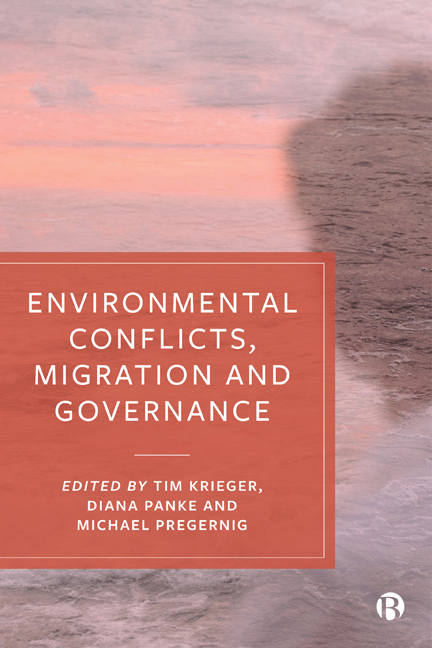Book contents
- Frontmatter
- Contents
- List of Figures and Tables
- List of Acronyms
- Notes on Contributors
- Acknowledgements
- 1 Environmental and Resource-Related Conflicts, Migration and Governance
- 2 Renewable Resource Scarcity, Conflicts and Migration
- 3 Extractive Resources, Conflicts and Migration
- 4 Climate Change, Conflicts and Migration
- 5 The Individual Level: Selection Effects
- 6 The Individual Level: Sorting Effects
- 7 Migration Governance at the State Level: Policy Developments and Effects
- 8 Environmental Migration Governance at the Regional Level
- 9 Migration Governance at the Global Level: Intergovernmental Organizations and Environmental Change-Induced Migration
- 10 The Link between Forced Migration and Conflict
- 11 Conflict-Prone Minerals, Forced Migration and Norm Dynamics in the Kimberley Process and ICGLR
- 12 On the Nexus Between Environmental Conflict, Migration and Governance: Concluding Remarks
- Index
11 - Conflict-Prone Minerals, Forced Migration and Norm Dynamics in the Kimberley Process and ICGLR
- Frontmatter
- Contents
- List of Figures and Tables
- List of Acronyms
- Notes on Contributors
- Acknowledgements
- 1 Environmental and Resource-Related Conflicts, Migration and Governance
- 2 Renewable Resource Scarcity, Conflicts and Migration
- 3 Extractive Resources, Conflicts and Migration
- 4 Climate Change, Conflicts and Migration
- 5 The Individual Level: Selection Effects
- 6 The Individual Level: Sorting Effects
- 7 Migration Governance at the State Level: Policy Developments and Effects
- 8 Environmental Migration Governance at the Regional Level
- 9 Migration Governance at the Global Level: Intergovernmental Organizations and Environmental Change-Induced Migration
- 10 The Link between Forced Migration and Conflict
- 11 Conflict-Prone Minerals, Forced Migration and Norm Dynamics in the Kimberley Process and ICGLR
- 12 On the Nexus Between Environmental Conflict, Migration and Governance: Concluding Remarks
- Index
Summary
Introduction
Scholars of environmental studies have devoted increasing attention to linkages between natural resource conflict and migration. This recognizes the interdependencies of environmental and resource-related conflicts in relation to migration, as well as the governance responses to attendant human security challenges. These scholarly trends are generating a small yet growing literature that examines how norm dynamics influence governance regimes that mitigate the likelihood of violent conflicts, which in turn reduces sources of forced migration in the form of internally displaced persons (IDPs) and refugees. In regional terms, Africa has been a predominant focus of such studies – especially in the continent's extractive sectors (see, for example, Chapter 4 in this volume for a relevant study on Somalia, and Mitchell, 2018 for additional cases). Throughout the 1990s, countries such as Sierra Leone, Angola, Liberia and the Democratic Republic of Congo (DRC) experienced severe and lengthy natural resource-related conflicts, which resulted in the forced migration of hundreds of thousands of IDPs and refugees. Although broader institutionalized regimes like the United Nations (UN) and the International Organization for Migration (IOM) counted peacekeeping and migration challenges under their purview, respectively, specific global or regional governance regimes that might address the underlying resource-related dynamics of violent conflict did not exist at the time. While it was recognized that migration that takes place in reaction to sustained violence such as inter-state or intra-state warfare was costly in terms of infrastructure, economic disruption, and the maintenance of IDP and refugee camps, no global or regional governance regime focused on the migration dimension of resource-related conflicts in fragile states (Grant, 2010; Grant et al, 2012). By the end of the 1990s, however, conditions began to change. Scholars, practitioners, media and civil society groups started to focus on how natural resources – minerals in particular – were sustaining the aforementioned civil wars in Africa (Le Billon, 2001; Grant et al, 2003; Mehler and Basedau, 2005; Alao, 2007; Lujala and Rustad, 2011; Wynberg and Sowman, 2014).
- Type
- Chapter
- Information
- Environmental Conflicts, Migration and Governance , pp. 197 - 218Publisher: Bristol University PressPrint publication year: 2020

